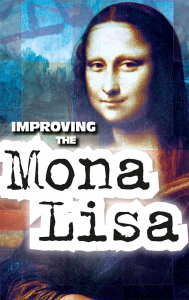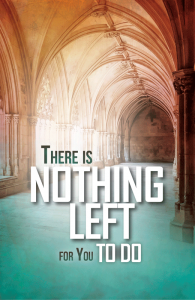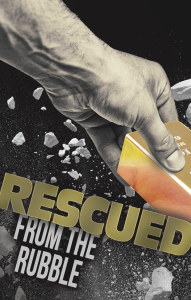 meaning of all the street signs that greet us in every town and city? There are so many signs: STOP signs, YIELD signs, SCHOOL CROSSING signs, ONE WAY signs and others. Signs are helpful, but there is one that is often rather unwelcome. It seems to show up just when you realize that you are on the wrong road and want to turn around. And there in front of you is a sign that says, “NO U-TURN.” Unwelcome as it may be, that sign is there for a very good reason.
meaning of all the street signs that greet us in every town and city? There are so many signs: STOP signs, YIELD signs, SCHOOL CROSSING signs, ONE WAY signs and others. Signs are helpful, but there is one that is often rather unwelcome. It seems to show up just when you realize that you are on the wrong road and want to turn around. And there in front of you is a sign that says, “NO U-TURN.” Unwelcome as it may be, that sign is there for a very good reason.
Once we were driving on a wet and slippery street. As we came over a hill, the driver ahead of us, with no warning, decided to make a U-turn right where the sign said, “NO U-TURN”! In spite of braking hard, we could not stop in time, and our car slid right into the side of his car, causing a lot of damage to both cars. He made a costly mistake and caused a lot of trouble by disobeying that sign.
I am glad to be able to tell you that on the road of life, God has no unwelcome signs that say, “NO U-TURN.” In fact, His signs, if we could see them, would be just the opposite. Everywhere we would see signs saying, “U-TURN HERE.” When John the Baptist preached long ago saying, “Repent,” it was as though he were saying to his listeners, “Make a U-TURN HERE.” All who are on the wrong road, whether young, middle-aged or older, repent of your sins — be very sorry about them and make a U-TURN HERE!
When you realize you are driving on the wrong road, obey the STOP sign, make a U-TURN, and then find someone to guide you. Some years ago, when we were completely lost in a maze of streets in a large city, a kind man saw us, and knowing the way out, he said, “Follow me.” He then got into his car, drove ahead of us, and led us in the right direction until we saw the highway and happily went our way on the right road.
The Lord Jesus, like John, came telling people to “repent.” Not only did He give the command, but He knew the way to heaven, so He said, “Follow Me” (Mark 2:14). He is the only one who could say, “I am the light of the world: he that [follows] Me shall not walk in darkness, but shall have the light of life” (John 8:12).
As you read this, think of the street signs and stop and consider if you might be on the wrong road. Then wherever you are, make a U-turn and call on Jesus, for “whosoever shall call upon the name of the Lord shall be saved” (Romans 10:13).
 himself on being an atheist, wrote to the editor of a newspaper:
himself on being an atheist, wrote to the editor of a newspaper:
 people use someone else for their own personal pleasure. When that pleasure is gone, they move on to someone else. A colleague of mine always used to nervously straighten up and apply her make-up before going home to her husband. She feared him leaving her — again — and wanted to pass his inspection. It wasn’t enough; he moved out for another woman. Have you felt that pain of rejection from a parent, friend or spouse? Do you have to hide part of who you are to be acceptable to others?
people use someone else for their own personal pleasure. When that pleasure is gone, they move on to someone else. A colleague of mine always used to nervously straighten up and apply her make-up before going home to her husband. She feared him leaving her — again — and wanted to pass his inspection. It wasn’t enough; he moved out for another woman. Have you felt that pain of rejection from a parent, friend or spouse? Do you have to hide part of who you are to be acceptable to others?
 a train leaving Quebec. After taking my seat in a crowded coach, a Roman Catholic priest sat down beside me. It wasn’t long before he noticed a small Bible case which I carried, and he asked me if I were a businessman.
a train leaving Quebec. After taking my seat in a crowded coach, a Roman Catholic priest sat down beside me. It wasn’t long before he noticed a small Bible case which I carried, and he asked me if I were a businessman. young mother in San Francisco made her doctor swear he would keep her secret. He would never reveal her name to anyone who came asking about the child he’d just delivered. But about thirty years later he was dying and the secret burned in him. He sat down to write a letter. The doctor finished his letter and then died with it still on his desk.
young mother in San Francisco made her doctor swear he would keep her secret. He would never reveal her name to anyone who came asking about the child he’d just delivered. But about thirty years later he was dying and the secret burned in him. He sat down to write a letter. The doctor finished his letter and then died with it still on his desk.
 be your favorite work of art, but it would be hard to find a more famous or imitated piece. Painted in approximately 1504 by Leonardo da Vinci, the Mona Lisa has had a pretty unique journey.
be your favorite work of art, but it would be hard to find a more famous or imitated piece. Painted in approximately 1504 by Leonardo da Vinci, the Mona Lisa has had a pretty unique journey.
 was raised in religion, but he was notorious for his pursuit of pleasure. However, like you and me, he had both a memory and a conscience.
was raised in religion, but he was notorious for his pursuit of pleasure. However, like you and me, he had both a memory and a conscience.
 lived in Greece a ruler named Archias. A very selfish man, he lived only for pleasure and cared little or nothing for the needs of his people. Many hated him, and at last some plotted together to kill him.
lived in Greece a ruler named Archias. A very selfish man, he lived only for pleasure and cared little or nothing for the needs of his people. Many hated him, and at last some plotted together to kill him.
 nothing — nothing at all. That’s what you brought into the world with you when you were born. Just nothing … zero.
nothing — nothing at all. That’s what you brought into the world with you when you were born. Just nothing … zero.
 products of the renovation project in the bathroom. But staring out from underneath it all was a small glistening object. Turns out the plumber in Calgary, Alberta, had uncovered a heavy $50,000 gold bar the size of a cell phone. It had the jeweler’s stamp on it as well as its serial number. The owners were thrilled, of course.
products of the renovation project in the bathroom. But staring out from underneath it all was a small glistening object. Turns out the plumber in Calgary, Alberta, had uncovered a heavy $50,000 gold bar the size of a cell phone. It had the jeweler’s stamp on it as well as its serial number. The owners were thrilled, of course.